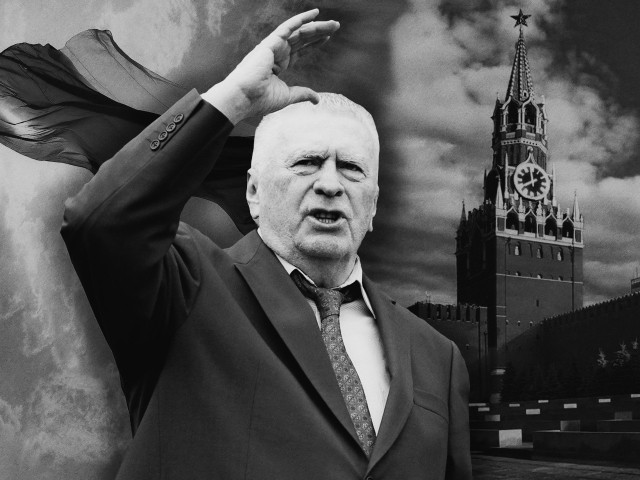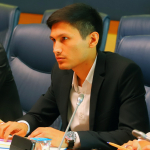Farewell, remnants of the USSR authoritarianism
Interesting
−
06 April 2022 45467 11 minutes
Today, 6 April, Vladimir Zhirinovsky, founder and sole leader of the LDPR (Liberal Democratic Party of Russia) has died. He was a member of the Russian parliament in all convocations after the collapse of the USSR.
Zhirinovsky was a true Soviet descendant who opposed the breakup of the USSR and condemned it until his death. At the same time, he was the only candidate who ran against all Russian presidents– Boris Yeltsin, Vladimir Putin, and Dmitry Medvedev in elections. He was also a well-known politician.
Below, we consider the past of Vladimir Wolfovich Zhirinovsky, known for the propaganda of imperialist and territorial claims of the Kremlin to the nearest neighbors and post-Soviet states.
Origin
Vladimir Volfovich Zhirinovsky was born on 25 April, 1946 in the city of Almaty of the Kazakhstan SSR (now the Republic of Kazakhstan). He was the youngest (sixth) child in the family.
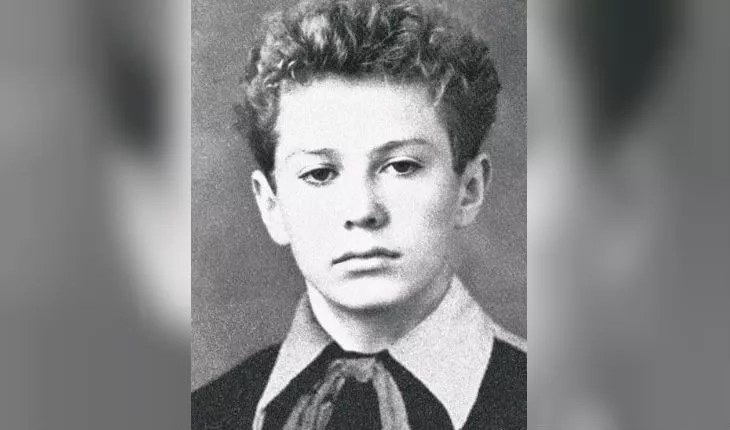
His mother, Alexandra Pavlovna (maiden name Makarova), was of Mordva origin. She moved to Almaty in the 1940's with her husband and five children. Her first husband, Andrei Vasilyevich Zhirinovsky, served in the NKVD (People’s Commissariat of Internal Affairs of the USSR), then as the head of the forestry department of the Turkestan-Siberian Road. He died of tuberculosis in 1944.
Vladimir Zhirinovsky’s father, Wolf Isaakovich Eidelstein, a native of Western Ukraine (then Poland) was deported to Kazakhstan at the beginning of the Great Patriotic War, where he worked on the Trans-Siberian Railway. In 1945 he married Alexandra Zhirinovskaya, but a year after the birth of his son; he was exiled to Poland, and then lived in Israel.
Education, academic degrees
In 1970, Vladimir Zhirinovsky graduated with honors from the Institute of Oriental Languages of the Moscow State University named after M. V. Lomonosov (since 1972 - Institute of Asian and African countries), the Faculty of History and Philology in specialty «Turkey and Turkish Language». From 1965 to 1967 he simultaneously studied at the University of Marxism-Leninism. In 1977, he graduated with honors from the evening session of the Faculty of Law of the Moscow State University named after M. V. Lomonosov.
Doctor of Philosophy. April 24, 1998 Zhirinovsky defended a dissertation in Moscow State University on the topic «Past, present and future of Russian people».
The beginning of the work and political career
Vladimir Zhirinovsky stated that he started his political career during his student years. In 1967, he wrote a letter to Leonid Brezhnev, General Secretary of the Central Committee of the Communist Party of the Soviet Union (KPSS), in which he proposed reforms «in the field of education, agriculture and urban economy». As a result, he was invited to the university department of the Moscow City Committee of the CCCU «for an interview», where he was told that young Vladimir’s proposals did not correspond to reality.
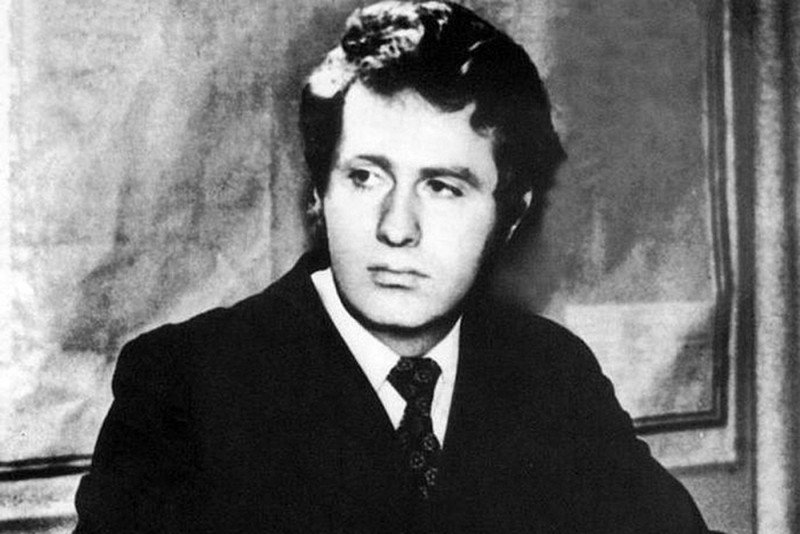
In 1969, the State Committee for Foreign Economic Relations of the USSR conducted an internship for him in Iran and Turkey through foreign trade associations «Tyajpromeksport» and «Nefteximpromeksport». In the same year, he became an interpreter in the construction of an oil refinery in Iskenderon, Turkey. In Turkey, he was arrested and later deported. According to Vladimir Zhirinovsky, the reason for the detention was a Soviet badge presented to one of the local residents.
From 1970 to 1972, he served in the Soviet Army, in the political department the headquarters of the Caucasus Military District (Tbilisi, Georgia).
From 1972 to 1975, he was a member of the Western European Sector of the International Division of the Soviet Peace Committee. In 1973, he participated in the organization of the Peace Congress in Moscow and the World Festival of Youth and Students in Berlin.
At the same time, in 1973, he became a freelance instructor of the Leninsky District Komsomol Committee (Moscow).
Since 1975 he has worked with foreign students at the Dean’s Office of the Faculty of Economics of the Higher School of the Trade Union Movement.
From 1975 to 1983 - counsellor and senior adviser of the European Department of the Foreign Law Board under the Ministry of Justice of the USSR (the Board considered disputes between Soviet and foreign citizens, including inheritance and divorce proceedings). So, he specialized in inheritance law.
From 1983 to 1990 –he was the employee of «Mir» publishing house, then senior legal adviser, head of the legal department. In 1999, he founded the Institute of World Civilizations in Moscow.
Political work from 1980 to 1990.
In 1989, he was nominated by the publishing house «Mir» as a candidate for the USSR MP, but withdrew his candidacy in favor of the editor Vitaly Korotich of «Ogonki» press.
In 1988, he participated in the founding congress of the Democratic Union. He was elected a member of the board of the Jewish Cultural Society.
On 13 December 1989, Vladimir Zhirinovsky attended a meeting of the initiative group for the creation of the Liberal Democratic Party of the Soviet Union (LDPSU). The program of the political organization was based on «Program of the Russian Social Democratic Party» which was previously developed by Zhirinovsky. LDPSU declared itself in opposition to the ruling CPSU.
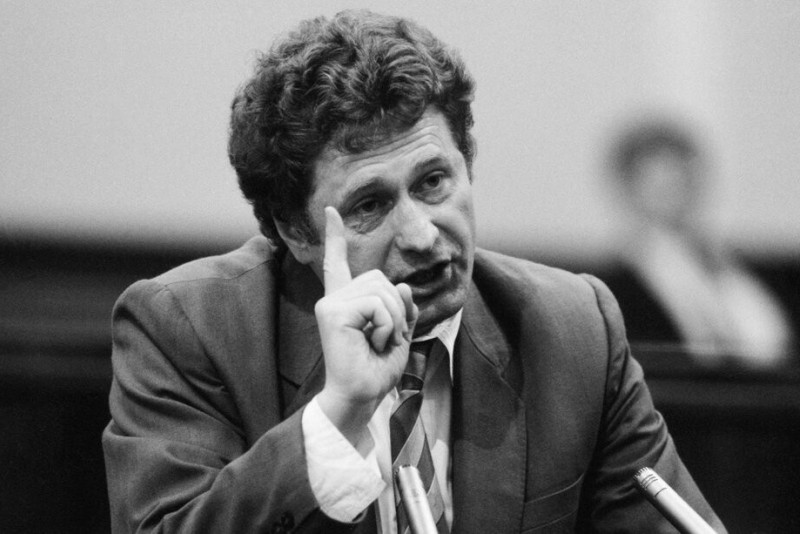
On 31 March 1990, at the constituent congress of LDPSU, Vladimir Zhirinovsky was elected its chairman. Since then, he had been the permanent leader of the party for more than 30 years, and since 2017, he had headed its Supreme Council.
In 1990-1991, he advocated the preservation of the Soviet Union and the creation of the National Rescue Committee of the USSR in the ranks of the Centrist Bloc (formed in July 1990, it includes LDPSU, the Union of Democratic Forces named after AD Sakharov, the Russian People's Front and other political forces) and was one of the leaders.
On 6 October 1990, on the initiative of Vladimir Bogachev, General Coordinator of the Central Committee of the LDPSU, the II (Extraordinary) Congress of the LDPSU took place, at which Zhirinovsky was dismissed from the post of chairman and expelled from the USSR. Vladimir Zhirinovsky and his supporters refused to comply with the decisions of the congress, which in turn called a conference and his former associates resigned from the party.
As a result, the party split into LDPSU and LDP. The LDPSU was registered by the Ministry of Justice and became the second officially registered party in the Soviet Union after the CPSU. (In 1992 the LDPSU was renamed the Russian Liberal Democratic Party (RLDM).
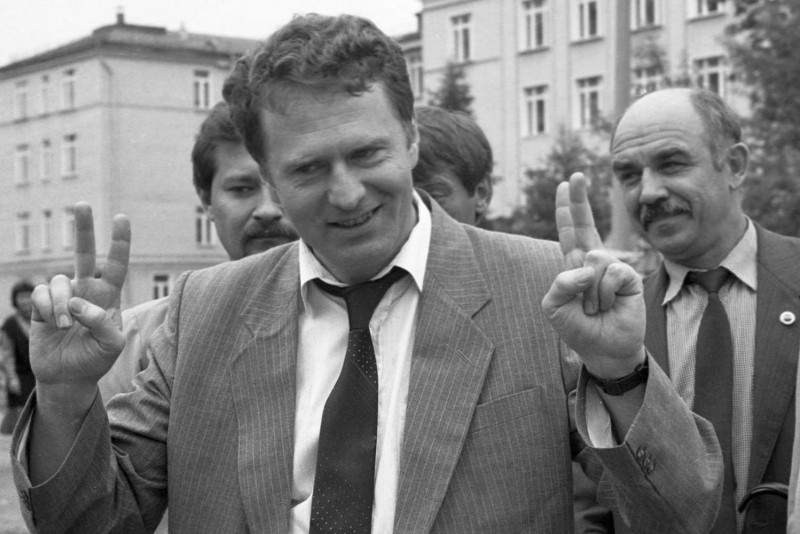
In August 1991, the State Committee for Emergency Situations (GKCHP (Russian)-SCES) organized a state meeting to prevent the signing of the Union Treaty, which provided for the creation of a new federation of sovereign states instead of the USSR. On it, Zhirinovsky spoke on behalf of the party in support of SCES, during an attempted coup by the organization. In the summer of 1993, he attended the Constitutional Conference convened by Russian President Boris Yeltsin to draft the basic law. In October of the same year, he supported Yeltsin in the confrontation with the Supreme Soviet of the Russian Federation, but condemned the violent actions of both sides.
Participation in presidential elections
Zhirinovsky had run for President six times. He is listed in the Russian Book of Records as the most active candidate for President of the Russian Federation. His best results were recorded in the 2008 election.
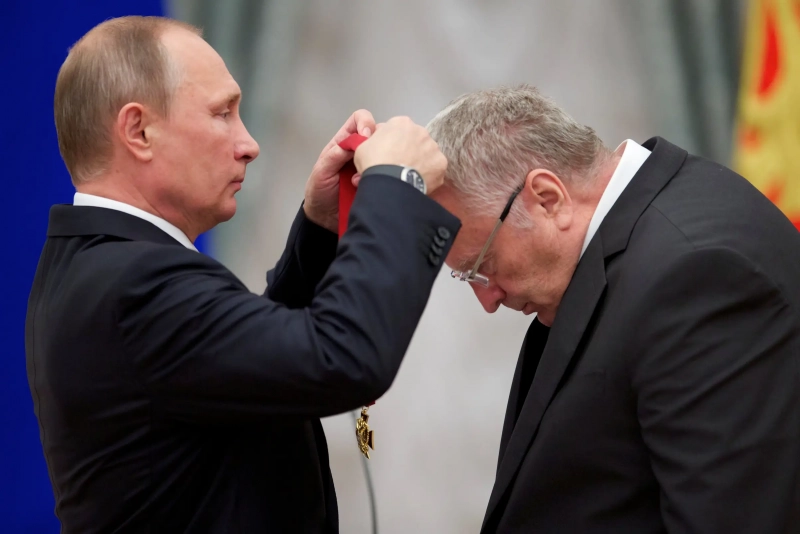
In the first presidential election on 12 June 1991, he received 7.81% of the vote, losing to Boris Yeltsin (57.30%) and Nikolai Rijkov (16.85%). In the elections of 16 June 1996, he received 5.7 percent of the votes (5th out of 10 candidates) and failed to enter the second round of voting (Boris Yeltsin was elected president on 3 July, with 53.82 percent). In the elections of 26 March 2000, Vladimir Zhirinovsky received 2.7% of the vote; taking fifth place out of 11 candidates, (Vladimir Putin was elected president with 52.94% of the vote). In the 8 March 2008 elections, Zhirinovsky took third place out of four candidates, Dmitry Medvedev (70.28%) and Gennady Zyuganov (17.72%). On 4 March 2012, he ran again for the next presidential election, finishing 4th out of five candidates with 6.22 percent (Vladimir Putin was elected President of the Russian Federation, 63.60 percent). In the 18 March 2018 elections, the LDPR leader received 5.65% of the vote, finishing third out of eight candidates (Vladimir Putin – 76.69 and Pavel Groodinin - 11.77%).
Work in the State Duma
Vladimir Zhirinovsky was an MP of the State Duma of the Russian Federation of all eight convocations. He had worked in the lower house of the parliament since 1993. From 2000 to 2011 he was vice-speaker of the State Duma of the Russian Federation, from 1993 to 1999 and from 2011 he headed the fraction of the RLDP.
On 12 December 1993 he was elected as an MP of the State Duma of the 1st convocation of the LDPR. He moved from a single-mandate district of Shchelkovsky 114 (Moscow region) to the Duma. In the lower house of Parliament, he headed the Liberal Democrats, the second-largest party after elections. He was a member of the Duma Defense Committee.
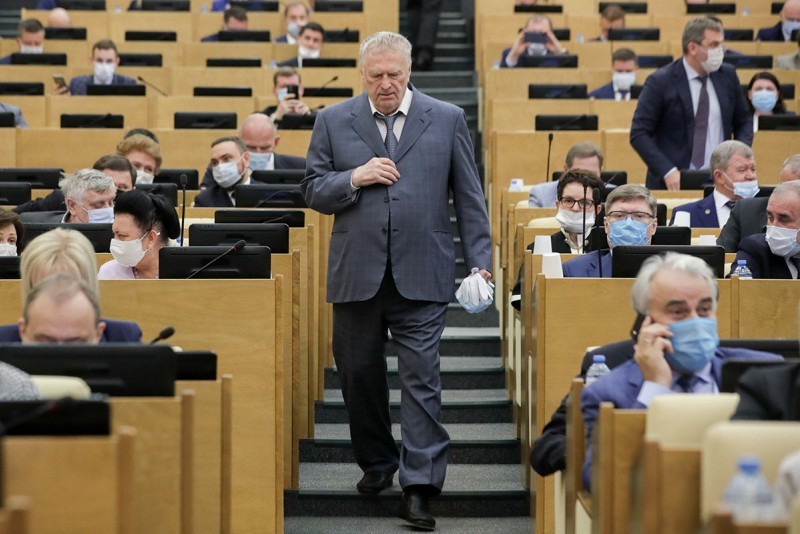
In subsequent years, he was elected to the State Duma as the most respected person on the list of RLDP.
On 17 December 1995, he was elected to the State Duma of the second convocation, was the leader of the party’s faction, a member of the Defense Committee.
On 19 December 1999, he was nominated to the State Duma of the Russian Federation of the 3rd convocation as a candidate from the “Zhirinovsky Bloc”. The bloc was formed after the Central Election Commission of the Russian Federation refused to register the RLDP electoral list due to inaccurate information about the property of candidates in the federal division. In January 2000, Vladimir Zhirinovsky was elected Deputy Chairman of the State Duma, Gennady Seleznev. His son Igor Lebedev became the leader of the RLDP parliamentary faction.
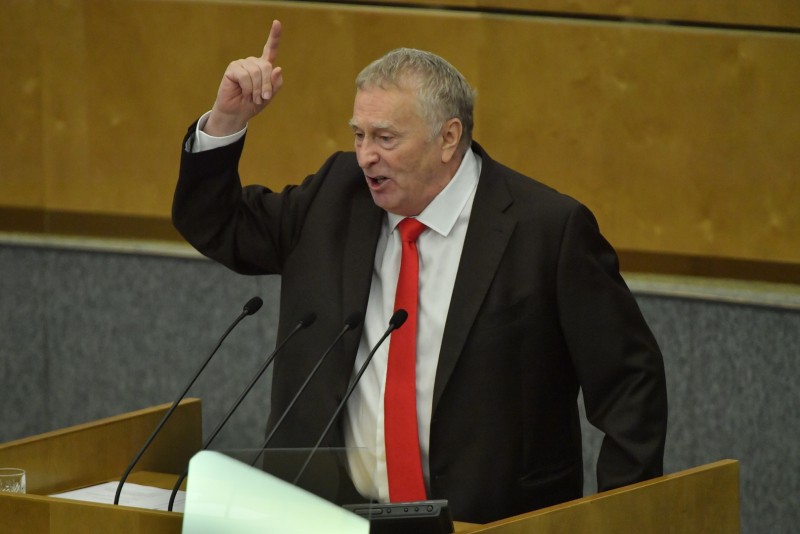
On 7 December, 2003 and 2 December 2007, Vladimir Zhirinovsky was elected MP of the State Duma IV and V convocations. From 2003 to 2011 he served as Deputy Speaker of the Parliament of Boris Gryzlov. He was a member of the Duma Defense Committee.
Later, on December 4, 2011 and September 18, 2016, he was elected as a member of parliament of the State Duma VI and VII convocations on the list of the LDPR. He ruled the party faction in the lower house of parliament.
On 19 September 2021, he was elected a MP of the State Duma of the Russian Federation of the 8th convocation, again heading the faction of the RLDP.
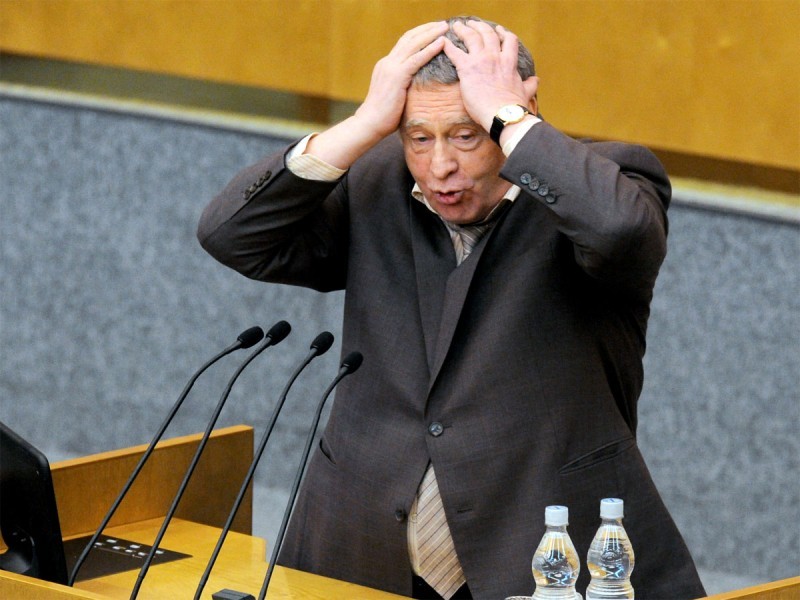
He was a delegate to the Parliamentary Assembly of the Council of Europe from 1996 to 2008. He was also a member of the State Council of the Russian Federation.
Taking part in regional elections
The RLDP leader repeatedly headed the party list in regional and local elections in the Russian Federation.
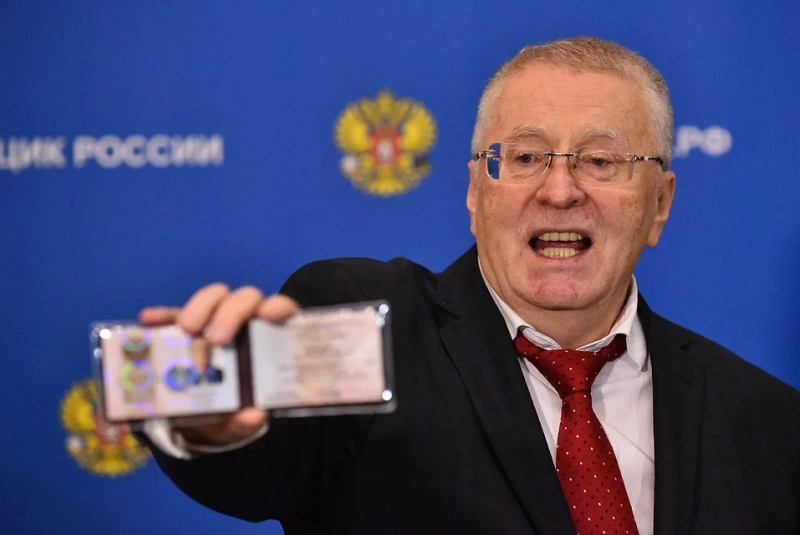
On 30 May 1999, Vladimir Zhirinovsky took third place in the elections in the Belgorod region (17.72%), losing to the current governor Evgeny Savchenko (53.46%) and to the auditor of the Russian Accounts Chamber Mikhail Beskhmelnytsyn (19.71%).
Family
On 9 February 2022, Vladimir Zhirinovsky was hospitalized at the Central Clinical Hospital (CCH) in Moscow in critical condition due to coronavirus infection. He had previously been vaccinated eight times against COVID-19. His last reported vaccination date was 20 December 2021.
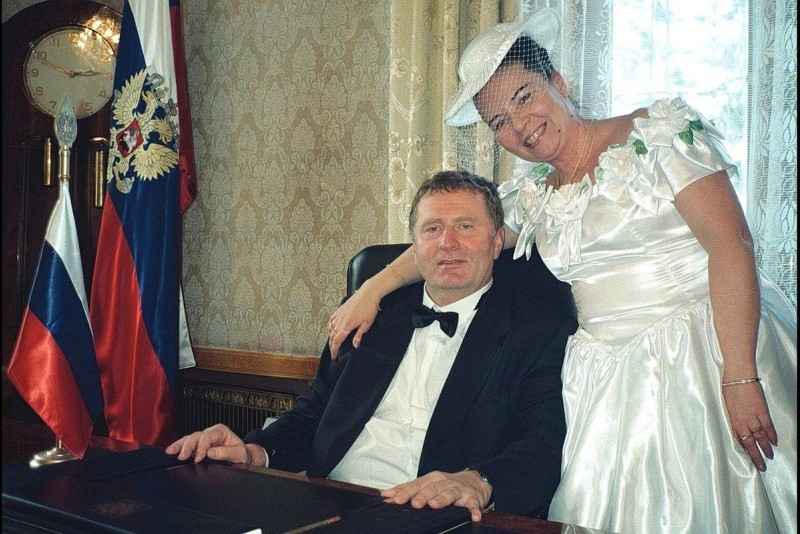
Vladimir Zhirinovsky was officially married to Galina Lebedeva (virologist, candidate of biological sciences). Vladimir Zhirinovsky himself said that their wedding took place in 1971. The couple filed for divorce in 1978 and they married again in the 1990's and since then they have been bound by a church marriage. Igor Lebedev (1972), son of Vladimir Zhirinovsky and Galina Lebedeva, was vice-speaker of the State Duma of the Russian Federation from 2011 to 2021. Zhirinovsky also reported that he has two illegitimate children: a daughter Anastasia Petrova (1983) and a son Oleg Eidelstein (Gazdarov, 1986).
Title, award, books
Vladimir Zhirinovsky was a retired colonel.
He was awarded the Orders «For Services» (2006, 2011, 2016, 2021), the Orders of Glory (2008), Alexander Nevsky (2015), and II and I Degree (2012, 2019) P.A. the Stolypin Medal. Zhirinovsky also was awarded the II-degree Order of Glory and Honor of the Republic of Abkhazia (2005). He was also a recipient of the Medal of Anatoly Koni of the Ministry of Justice of the Russian Federation, the Order of Prince Daniil of the I degree Moscow Russian Orthodox Church (2021) and an Honored Lawyer of the Russian Federation (2000).
He was a full member (academician) of the International Academy of Ecology and Environmental Management, an honorary academician of the Academy of Natural Sciences, a full member of the International Academy of Informatization, a full member (academician) of the Academy of Social Sciences. .
Zhirinovsky was fluent in English, French, German and Turkish.
He was the author of more than 500 books and articles, including the 100-volume book «Political Classics». The current governor of the Khabarovsk region, and member of the Supreme Council of the RLDP, Mikhail Degtyarev, published two books dedicated to Vladimir Zhirinovsky: «The Prophet at his own homeland» (2015) and «The Prophet 2.0» (2021).
The leader of the Liberal Democrats wrote several albums of songs, including his own compositions. He was also the author of the anthem of the Liberal Democratic Party.
In 2016, Zurab Sereteli installed a monument to Vladimir Zhirinovsky in the yard of the Institute of World Civilizations (Moscow).
Live
All